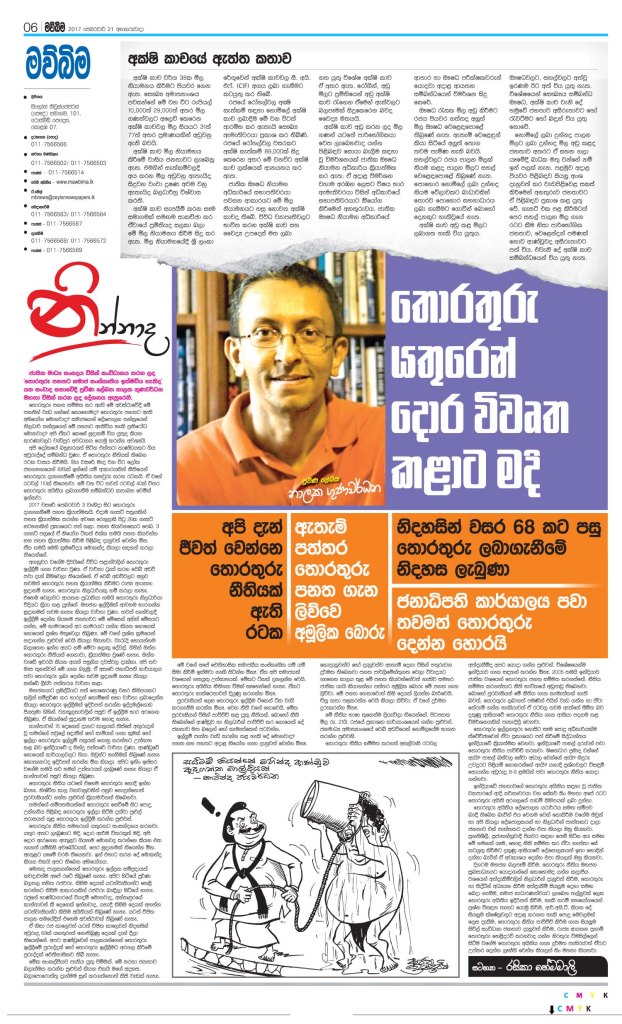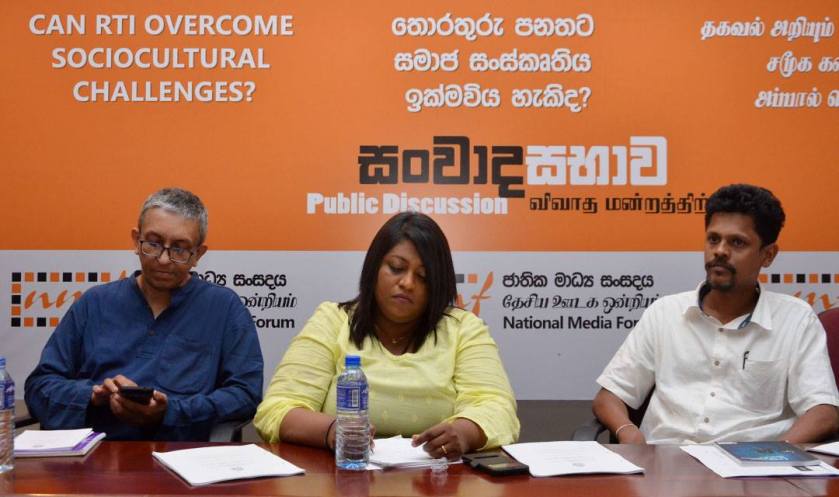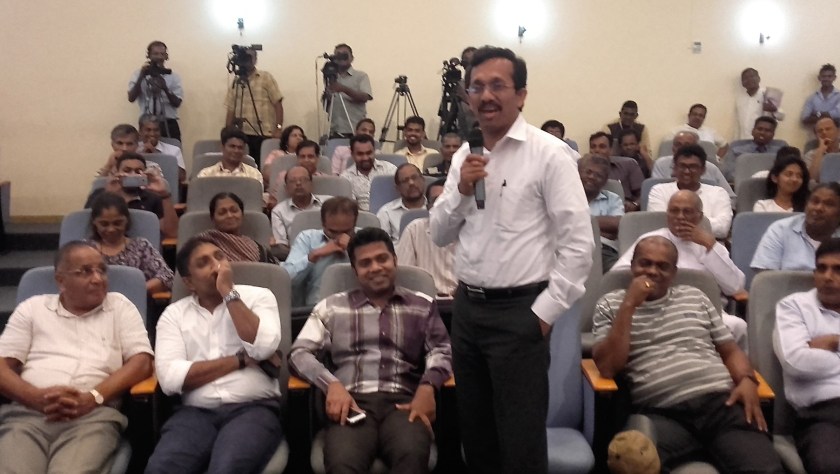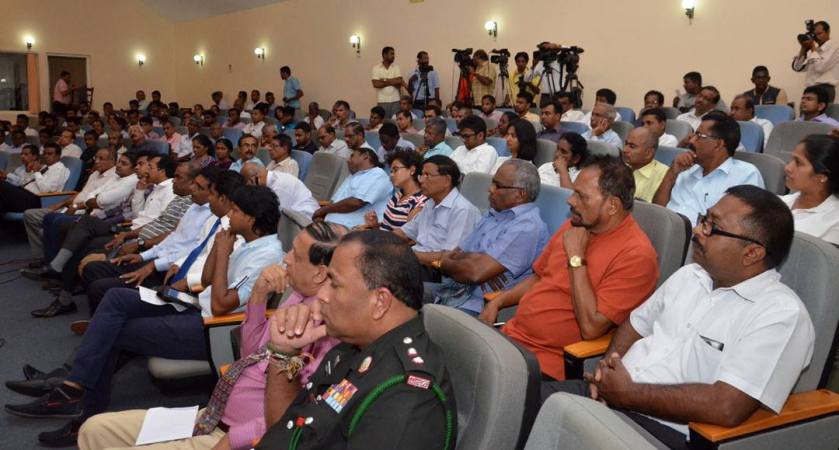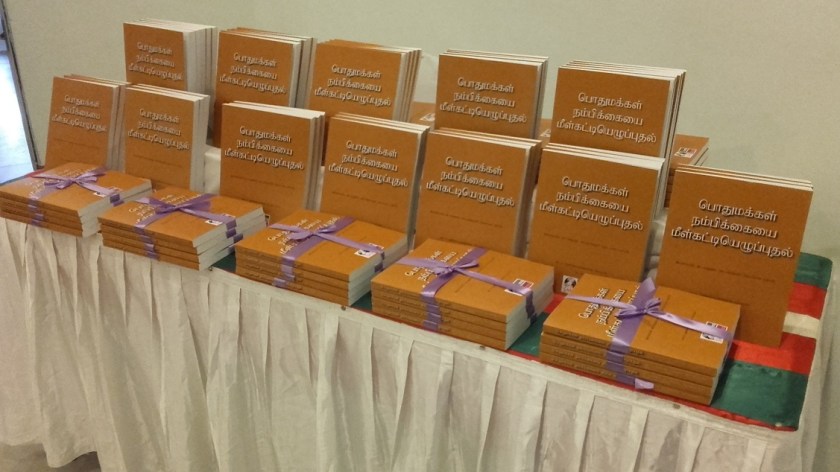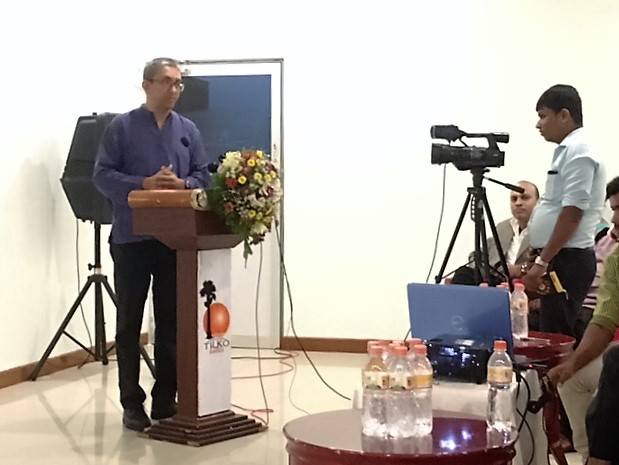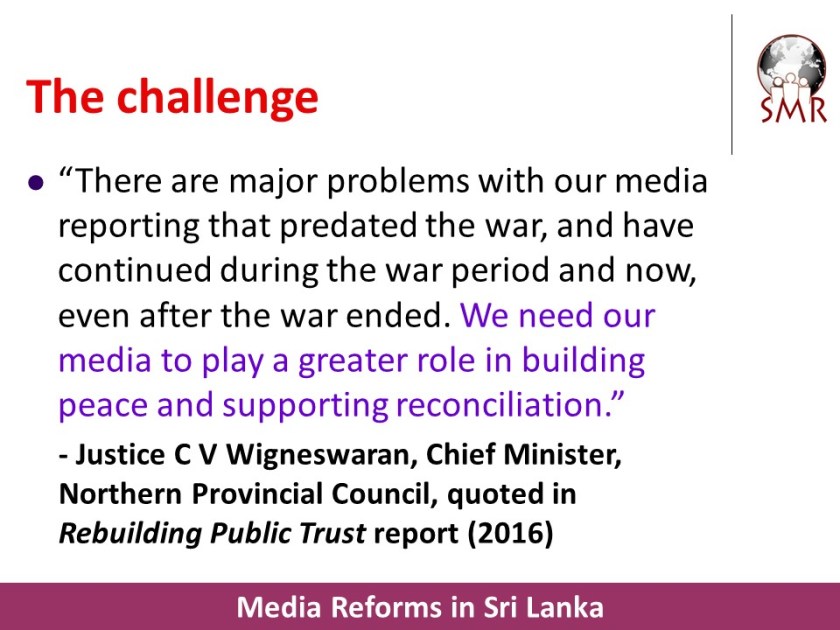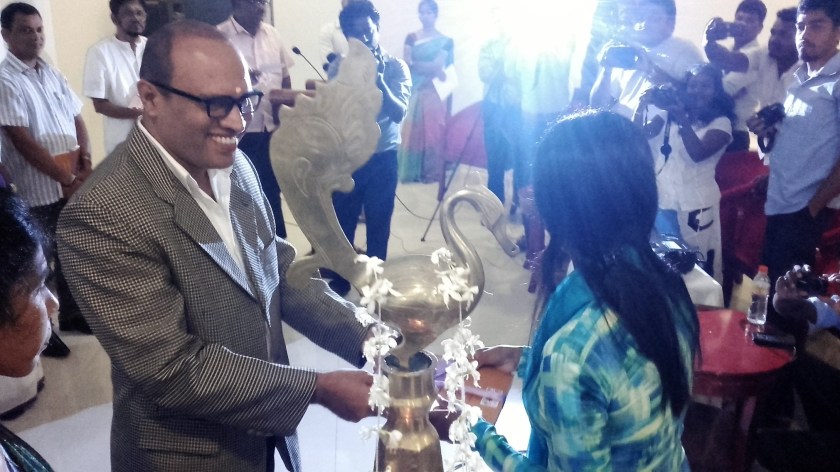On 21 Feb 2017, Sinhala language broadsheet newspaper Mawbima carried an article based on my recent public talk on the Right to Information (RTI) in Sri Lanka.

ජාතික මාධ්ය සංසදය විසින් සංවිධානය කරන ලද ‘තොරතුරු පනතට සමාජ සංස්කෘතිය ඉක්මවිය හැකිද’ යන සංවාද සභාවේදී ප්රවීණ ලේඛක නාලක ගුණවර්ධන මහතා විසින් කරන ලද දේශනය ඇසුරෙනි.
තොරතුරු පනත සම්මත කර ඇති මේ අවස්ථාවේදී මේ පනතින් වැඩ ගන්නේ කොහොමද? තොරතුරු පනතට ඇති අභියෝග මොනවාද? සමාජයෙන් දේශපාලන තන්ත්රයෙන් නිලධාරි තන්ත්රයෙන් මේ පනතට ඇතිවිය හැකි ප්රතිරෝධ මොනවාද? අපි ඒකට කෙසේ සූදානම් විය යුතුද කියන කාරණාවලට වැඩිපුර අවධානය යොමු කරන්න අවශ්යයි.
අපි ලෝකයේ බහුතරයක් සිටින එක්තරා කාණ්ඩයකට ගිය අවුරුද්දේ සම්බන්ධ වුණා. ඒ තොරතුරු නීතියක් තිබෙන රටක වාසය කිරීමයි. ගිය වසරේ මැද වන විට ලෝක ජනගහනයෙන් 88%ක් ඉන්නේ යම් ආකාරයකින් නීතියෙන් තොරතුරු දැනගැනීමේ අයිතිය තහවුරු කරන රටකයි. ඒ වගේ රටවල් 110ක් තියෙනවා. මේ වන විට තවත් රටවල් 40ක් විතර තොරතුරු අයිතිය ලබාගැනීම සම්බන්ධව කතාබහ වෙමින් ඉන්නවා.

2017 වසරේ පෙබරවාරි 3 වැනිදා සිට තොරතුරු දැනගැනීමේ පනත ක්රියාත්මකයි. එදාම ගැසට් පත්රයකින් පනත ක්රියාත්මක කරන්න අවශ්ය රෙගුලාසි පිටු 26ක ගැසට් සටහනකින් ප්රකාශයට පත් කළා. පනත කියවනකොට පෙබ. 3 ගැසට් පත්රයේ ඒ නියෝග ටිකත් එක්ක තමයි පනත කියවන්න සහ පනත ක්රියාත්මක කිරීම පිළිබඳ දැනුවත් වෙන්න ඕන. ඒක තමයි මෙහි ක්රමවේදය මොකක්ද කියලා සඳහන් කරලා තියෙන්නේ.
අගනුවර වගේම දිවයිනේ විවිධ පළාත්වලින් තොරතුරු ඉල්ලීම් ගැන වාර්තා වුණා. ඒ වාර්තා ට්රැක් කරන වෙබ් අඩවි පවා දැන් බිහිවෙලා තියෙන්නේ. ඒ වෙබ් අඩවිවලට අනුව තවමත් තොරතුරු පනත ක්රියාත්මක කිරීමට රාජ්ය ආයතන සූදානම් නැහැ. තොරතුරු නිලධාරියකු නම් කරලා නැහැ. එහෙම වෙලාවට ආයතන ප්රධානියා තමයි තොරතුරු නිලධාරියා විදියට ක්රියා කළ යුත්තේ. මහජන ඉල්ලීමක් ආවහම භාරගන්න සූදානමක් තවම නැහැ කියලා වාර්තා වුණා. තවත් තැන්වලදී ඉල්ලීම් දෙන්න ගියහම ජනතාවට මේ මේසෙන් අනිත් මේසයට යන්න, මේ කාමරයෙන් අර කාමරයට යන්න කියන නොයෙක් නොයෙක් ප්රශ්න මතුවෙලා තිබුණා. මේ වගේ ප්රශ්න ක්රමයෙන් හදාගන්න පුළුවන් වෙයි කියලා හිතනවා. වැරැදි හොයන්නම බලාගෙන ඉන්න අයට නම් මේවා ලොකු දේවල්. ගිහින් ඔන්න තොරතුරු නීතියක් ගෙනාවා, ක්රියාත්මක වුණේ නැහැ. ඔන්න වැඩේ ඉවරයි කියන අයත් පහුගිය දවස්වල දැක්කා. අපි තව මාස තුනක්වත් මේ ගැන බලමු. ඒ අතරේ ජනාධිපති කාර්යාලය පවා තොරතුරු ලබා දෙන්න තවම සූදානම් නැහැ කියලා සන්ඩේ ලීඩර් පත්තරය වාර්තා කළා.
මහජනයාට ප්රසිද්ධියට පත් නොකෙරුණු වසර කිහිපයකට කලින් සම්පූර්ණ කර භාරදුන් කොමිෂන් සභා වාර්තා ලබාදෙන්න කියලා තොරතුරු ඉල්ලීමක් ඉදිරිපත් කරන්න ඉද්දමල්ගොඩ පියතුමා ගිහින්. ව්යාකූලතාවලින් පසුව ඒ ඉල්ලීම භාර අරගෙන තිබුණා. ඒ කියන්නේ සූදානම තවම හොඳ නැහැ.
කාන්තාවන් 15 දෙනෙක් දැනට කාලයක් තිස්සේ අතුරුදන් වූ තමන්ගේ පවුලේ ඥාතීන් හෝ සැමියන් ගැන කුමක් හෝ ඉල්ලා තොරතුරු ඉල්ලුම් පත්රයක් ගොනු කරන්නට උත්සාහ කළ බව ඉන්දියාවේ ද හින්දු පත්තරේ වාර්තා වුණා. ආණ්ඩුවේ නොයෙක් කාර්යාලවලට ගියා. ඔවුන්ට හැඟීමක් තිබුණේ නැහැ කොතැනටද ඉදිරිපත් කරන්න ඕන කියලා. අපිට ඉතිං ඉස්සර වගේම තමයි හරි හමන් උත්තරයක් ලැබුණේ නැහැ කියලා ඒ කාන්තාවන් පසුව කියලා තිබුණා.
තොරතුරු නීතිය යටතේ එහෙම තොරතුරු නොදී ඉන්න බැහැ. නිශ්චිත කාල වකවානුවකින් පසුව නොදුන්නොත් පුරවැසියන්ට ගන්න පුළුවන් ක්රියාමාර්ගත් තිබෙනවා.
තමන්ගේ සමීපතමයන්ගේ තොරතුරු සෙවීමේ සිට පොදු උන්නතිය පිළිබඳ තොරතුරු ඉල්ලා සිටීම දක්වා පුළුල් පරාසයක් තුළ තොරතුරු ඉල්ලීම් කරන්න පුළුවන්.
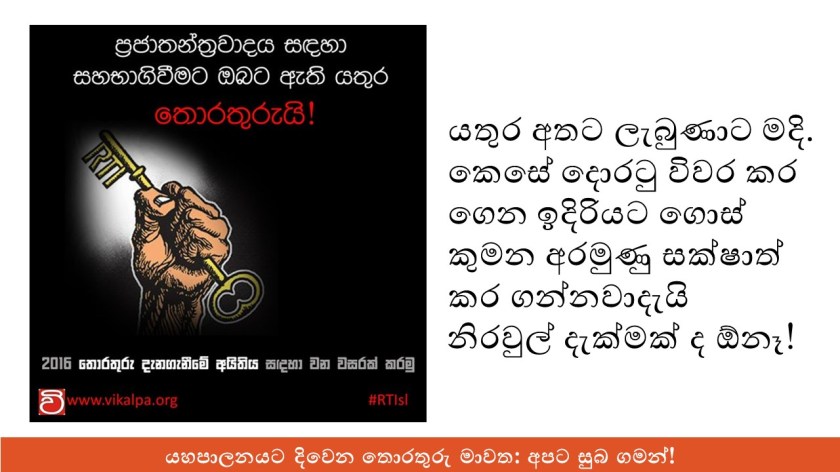
තොරතුරු නීතිය සමහරුන් යතුරකට සංසන්දනය කරනවා. යතුර අතට ලැබුණාට මදි. ෙදාර ඇරීම විතරකුත් මදි. අපි ෙදාර ඇරගෙන ඇතුළට ගියහම මොනවද කරන්නෙ කියන එක ගැනත් යම්කිසි අවබෝධයක්, පෙර සූදානමක් තියෙන්න ඕන. ඇතුළට යෑමේ වරම තියෙනවා. ඉන් එහාට කරන දේ මොකක්ද කියන එකයි අපට තිබෙන අභියෝගය.
මොකද පාලකයන්ගෙන් තොරතුරු ඉල්ලන සම්ප්රදායක් කවදාවත්ම අපේ රටේ තිබුණේ නැහැ. අපිට හිටියේ පූර්ණ බලතල සහිත රජවරු. කිසිම දෙයක් යටත්වැසියන්ට හෙළි කරන්නට කිසිම ආකාරයකින් රජවරු බැඳිලා හිටියේ නැහැ. රජුගේ භාණ්ඩාගාරයේ වියදම් මොනවාද, අන්ත–පුරයේ කාන්තාවන් කී දෙනෙක් ඉන්නවාද, යනාදී කිසිම දෙයක් අහන්න යටත්වැසියන්ට කිසිම අයිතියක් තිබුණේ නැහැ. යටත් විජිත පාලන සමයේදීත් එහෙම අවස්ථාවක් තිබුණේ නැහැ.
ඒ නිසා රජ කාලෙවත් යටත් විජිත කාලෙවත් නිදහසින් අවුරුදු 68ක් යනතුරුත් නොතිබුණු දෙයක් දැන් දීලා තියෙන්නේ. අපට ආණ්ඩුවෙන් පාලකයන්ගෙන් තොරතුරු ඉල්ලීමේ පුරුද්දක් හෝ තොරතුරු ඉල්ලීමට අරගල කිරීමේ පුරුද්දක් ඓතිහාසිකව තිබී නැහැ.
මේක සංකල්පීයව පැනිය යුතු පිම්මක්. මේ හරහා ජනතාව බලාත්මක කරන්න පුළුවන් කියන එකයි මගේ අදහස. බලාපොරොත්තු දැන්මම සුන් කරගත්තොත් කිසි වැඩක් නැහැ.
මේ වගේ අපේ ඓතිහාසික සමාජයීය සංස්කෘතික යම් යම් සීමා කිරීම් ඉක්මවා නැඟී සිටින්න ඕනෑ. ඒක අපි සමාජයක් වශයෙන් ගතයුතු උත්සාහයක්. මේකට ටිකක් දඟලන්න වෙයි. තොරතුරු අයිතිය නීතිගත වීමක් සෑහෙන්නේ නැහැ. ඒකට තොරතුරු සාක්ෂරතාවත් දියුණු කරගන්න ඕනෑ.
පුරවැසියන් ලෙස තොරතුරු ඉල්ලීම ටිකෙන් ටික වැඩි කරගැනීම කරන්න ඕනෑ. වෙන නීති වගේ නොවෙයි. මේක පුරවැසියන් විසින් පාවිච්චි කළ යුතු නීතියක්. බොහෝ නීති තිබෙන්නේ ආණ්ඩුව හා නිලධාරීන් පාවිච්චි කර නොයෙක් දේ ජනතාව මත බලෙන් හෝ කැමැත්තෙන් පටවන්න.
ඉල්ලුම් පැත්ත වැඩි කරන්න කළ හැකි දේ මොනවාද? පනත සහ පනතට අදාළ නියෝග ගැන දැනුවත් වෙන්න ඕනෑ. නොදැනුවත්ව හෝ දැනුවත්ව ඇතැම් දෙනා විසින් පතුරුවන දුර්මත තිබෙනවා පනත පාර්ලිමේන්තුගත වෙලා විවාදයට ගැනෙන කාලය තුළ මේ පනත කියවන්නේවත් නැතිව සමහර ජාතික යැයි කියාගන්නා පත්තර අමූලික බොරු මේ පනත ගැන ලිව්වා. මේ පනත ගෙනාවොත් කිසි දෙයක් ලියන්න බැරිවෙයි. චිත්ර කතා පළකරන්න වෙයි කියලා කිව්වා. ඒ වගේ දුර්මත දුරුකරන්න ඕනෑ.
මේ නීතිය භාෂා තුනෙන්ම ලියැවිලා තියෙන්නේ. පිටපතක මිල රු. 21යි. රජයේ ප්රකාශක කාර්යාංශයෙන් ගන්න පුළුවන්. ජනමාධ්ය අමාත්යාංශයේ වෙබ් අඩවියෙන් නොමිලයේම භාගත කරන්න පුළුවනි.
තොරතුරු නීතිය සම්මත කරගත් අසල්වැසි රටවල අත්දැකීම්ද අපට යොදා ගන්න පුළුවන්. විශේෂයෙන්ම ඉන්දියාව ගැන සඳහන් කරන්න ඕනෑ. 2005 තමයි ඉන්දියාව ජාතික වශයෙන් තොරතුරු පනත සම්මත කරගත්තේ. නීතිය සම්මත කරගත්තාට නීති භාවිතයේ අඩුපාඩු තිබෙනවා. බොහෝ පුරවැසියන් මේ නීතිය ගැන කැමැත්තක් නැති බවත්, තොරතුරු ලබාගත් පමණින් එයින් වැඩ ගන්න හා ඒවා තේරුම් ගන්න හැකියාවත් ඒ රටවල තවම ඇත්තේ සීමිත බව දකුණු ආසියාවේ තොරතුරු නීතිය ගැන ආසියා පදනම කළ විමර්ශනයකින් පැහැදිලි වෙනවා.
තොරතුරු ඉල්ලනතුරු නොසිට සෑම පොදු අධිකාරියක්ම ස්වේච්ඡාවෙන් ඒවා ප්රකාශයට පත් කිරීමේ සිද්ධාන්තය ඉන්දියාවේ ක්රියාත්මක වෙනවා.
ඉන්දියාවේ පාසල් දරුවන් පවා තොරතුරු නීතිය පාවිච්චි කරනවා. ශිෂ්යාධාර ප්රමාද වන්නේ ඇයි? පාසල් බස්වල සේවා අඩාල වෙන්නේ ඇයි? මදුරු උවදුරට පිළියම් නොකරන්නේ ඇයි? යනාදී ප්රශ්නවලට විසඳුම් සොයන්න අවුරුදු 8-9 ළමයින් පවා තොරතුරු නීතිය යොදා ගන්නවා.

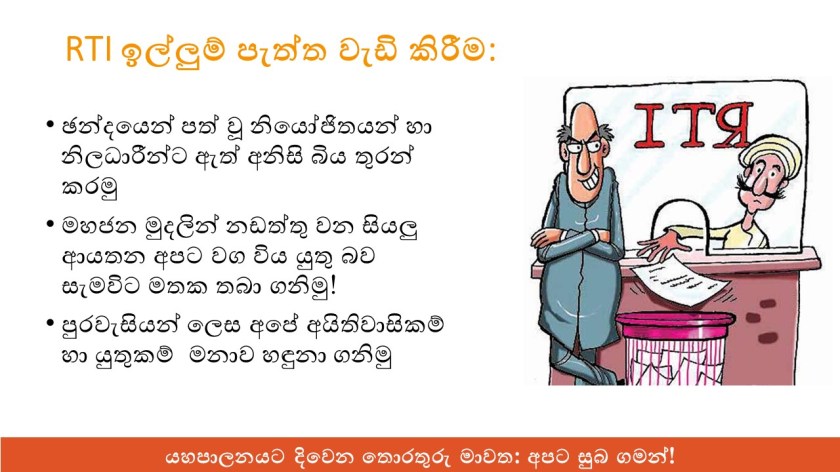
ඉන්දියාවේ ජනතාවගේ තොරතුරු අයිතිය සඳහා වූ ජාතික ව්යාපාරයේ ආදි කර්තෘවරයා වන සේකර් සිං මහතා අපේ රටට තොරතුරු අයිති අරගලයේ පාඩම් කිහිපයක් ලබා දුන්නා.
තොරතුරු අයිතිය දේශපාලන යථාර්ථය සමඟ සමීපව බැඳී තිබෙන බැවින් එය වෙනම වෙන් නොකිරීම වගේම ඔවුන් හා අපි කියලා දේශපාලකයන් හා නිලධාරීන් පැත්තකට දාලා ජනතාව එක් පැත්තකට දාන්න එපා කියලා ඔහු කියනවා. ප්රගතිශීලී, ප්රජාතන්ත්රවාදී පියවර සඳහා පෙනී සිටින අය සමඟ මේ ගමනක් යෑම, හොඳ නීති සම්මත කර ඒවා නැත්තා සේ කටයුතු කිරීමට දකුණු ආසියාවේ දේශපාලකයන් ඉතා හොඳින් දන්නා බැවින් ඒ අවකාශය දෙන්න එපා කියලත් ඔහු කියනවා.
දිගටම මහජන බලපෑම් කිරීම, තොරතුරු නීතිය මහජන සුබසාධනයට යොදාගන්නේ කොහොමද යන්න කලාපීය වශයෙන් අත්දැකීම්වලින් නිලධාරීන් දැනුවත් කිරීම, තොරතුරු හා සිද්ධීන් අධ්යයන කිරීම අත්දැකීම් සියලුම දෙනා සමඟ බෙදා ගැනීම, සමාජ සාධාරණත්වයට ලැබෙන තල්ලුවක් ලෙස තොරතුරු අයිතිය ඉදිරිපත් කිරීම, හැකි තරම් සහයෝගයෙන් ප්රශ්න විසඳන තැනට යොමු කිරීම, ආර්.අයි.ටී. කියන දේ සියලුම ක්ෂේත්රවලට අදාළ කරගත හැකි පොදු මෙවලමක් ලෙස දැකීම, තොරතුරු නීතිය පාවිච්චි කිරීම ගැන සියලුම සිවිල් සංවිධාන ජනතාව දැනුවත් කිරීම, රාජ්ය ආයතන ප්රගාමි තොරතුරු හෙළිදරව් කරනවාද යන්න නිරතුරු විමසිල්ලෙන් සිටීම වගේම තොරතුරු අයිතිය ගැන දුර්මත පැතිරුවත් ඒවාට උත්තර දෙන්න ලෑස්ති වෙන්න කියලත් සිං මහතා කියනවා.
